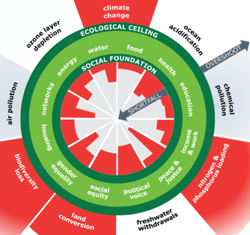>Top 4. Marks in Anthoropocene:
- The Third Way "Commons":
- Nether US-style Neoliberalism, nor USSR-style nationalization
- Public goods should be democratically governed, such as water, electricity, housing, health care, education, etc.
- Four category of Commons: covers 1) culture, 2) external nature, 3) internal nature, 4) human being
- Commons composed of knowledge, natural environment, human right will constitute new communism, or association.
- >Top New Das Capital Theory: MEGA (Marks-Engels-Geamtausgabe (=complete edition))
- the idea comes from the late Marks, unfinished edition of Das Capital, which was to be published after 1868.
- Mark's Progressive View of History; was backed by productivism, and Europe-centrism
- Red and Green have been long considered incompatible.
- However, 'material metabolism' in Das Capital means natural metabolism; emphasize external environment.
- Labor: is human characteristic activities which control and mediate material metabolism of humans and nature.
- Das Capital warned that capitalism would undermine the conditions of sustainable production (i.e., derangements or cracks in material metabolism)
- Unrestricted pursuit of profit by capital means progress in technology for exploitation.
- 1868-1883 K. Marks, wrote little, studied critique of capitalism through studying ecology and community including geology, botany, chemistry, mineralogy, deforestation, fossil fuel overspending, species extinction.
- recognized that human activities have caused the extinction of many species.
- discerned that capitalism deepens cracks in material metabolism and shift them externally on global basis through pursuing technological innovation; finally capitalism will no longer be viable (birth of Eco-Socialism)
- >Top Breaking away from the Productivity Supremacy; which may contradict with the Progressive View of History, also may reconsider Euro-centrism.
- Das Capital, Vol.1; "The more developed industrial countries shows the future vision of the less developed countries; is this theory applicable to the case of Russia?, then Russia have to aim for modernization under capitalism."
- Instead, Marks insisted that Russia does not need to destroy the remaining community to aim modernization; such community will be an important base of resistance against capitalism which is about to swallow up the whole world.
- The Communist Manifesto (Preface to the 2nd Russian Edition); states that the communal ownership of land in current Russia can be a starting point for communistic development ...; (A multilinear view of history)
- In late 1950s, Marks clarified his anti-colonialist position, and studied Markgenossenschaft (Mark community) of Germanic people:
- Communal regulation covers; joint ownership of land, regulation of production methods, prohibition of trade of goods with outside, such as timber, pigs, wine, etc.; which aims sustainable agriculture, or maintaining circulation of land nutrients.
- Egalitarians' way of life of Germanic people; adopted lottery system of land use to prohibit proprietary use of fertile land, or uneven distribution of wealth.
- Convinced that social equality and social sustainability are closely linked.
- Such farming community has survived through the Middle Age.
- >Top Late Marks convinced that what capitalism brings is not a progress toward communism, but an irreversible destruction of natural environment and devastation of society.
-
| Year |
Key concept |
Economic growth |
Sustainability |
| 1840s-50s |
Productivity Supremacy
(Communist Manifesto) |
◯ |
☓ |
| 1860s |
Eco-Socialism
(Das Capital 1st Ed.) |
◯ |
◯ |
| 1870s-80s |
Degrowth Communism
(Critique of the Gotha Program) |
☓ |
◯ |
- Critique of the Gotah Platform of 1875: states "each according to his ability, and each according to his need..." Communism was interpreted to solve unequal distribution through unlimited productivity and unlimited abundance.
Capitalism is "in a state of struggle with science."
- Rational agriculture to overcome the crisis caused by the capitalism should be based on the knowledge of natural science. (Here the science means ecological science).
- The stability of a communal society without economic growth has organized a sustainable, equal human and natural material metabolism.
(Here this means equal sustainable, degrowth economy.)
- [Cf: This part can be rewritten in 2021:
The stability of a society without pandemic infection has organized a sustainable, human and virus coexisting biosphere; where weakly mutated virus sometimes infecting humans, who occasionally catch a cold but rarely become fatal.]
- Marks' ideological transition:
- 1840s-50s: based on supremacy of productivity; wrote Communist Manifest, Review on India.
- 1860s: based on Eco-socialism; wrote Das Capital, Vol.1
- 1870s-80s: based on degrowth communism; wrote Critique of the Gotha Platform, and letter to Zasuriqi (Engles could not understand)
- Critique of the Gouda Platform:
Emphasis on cooperative wealth (der genossenshaftliche Reichthum) in the future society instead of individualistic production aiming to increase money and private property.
- Marks' last years' critique of capitalism: attained a theory of degrowth communism, as a continuation of unfinished capital theory.
|
4.
人新世のマルクス:
- 第三の道 "Commons" (=共):
- 米国型新自由主義でも、ソ連型国有化でもなく
- 水、電力、住居、医療、教育などを公共財として民主主義的に管理
- 4つのCommons: 1) 文化、2) 外的自然、3) 内的自然、4) 人間
- 知識、自然環境、人権、社会のcommons=communism=association
- Marx-Engels-Gesamtausgabe: MEGA: 新しい資本論
- 晩期Marxから学ぶ; 資本論の未完部分;
1868年以降の第1巻の続巻として
- Marxの進歩史観=生産力至上主義+Europe中心主義
- 緑と赤は相容れないとされてきた。
- しかし」資本論の「物質代謝論」=自然的物質代謝、いわば外部環境重視の思想
- 労働=人間と自然の物質代謝を制御媒介する人間に特徴的な活動
- 資本論は、資本主義が持続可能な生産条件を掘り崩す(物質代謝の錯乱や亀裂)ことに警鐘を鳴らした」
- 無制限な資本の利潤追求=略奪する技術における進歩
- Marxは、1968-1883 (15年間)ほとんど著作せず、ecology研究と共同体研究を通じて資本主義批判を研究 (地質学、植物学、化学、鉱物学など); 森林伐採、化石燃料乱費、種の絶滅
- 人間の活動が多くの生物種を絶滅させてきた
- 資本主義は技術革新によって、物質代謝の亀裂を様々に外部転嫁しながら世界規模で深めていく。最終的には資本主義も存続できなくなる (Eco-Socialism)
- 生産力至上主義からの決別=進歩史観をも揺るがす
- また生産力至上主義からの決別→欧州中心主義の見直し
- 資本論第1巻: "産業のより発展した国は、発達の遅れた国に対して、他ならぬその国自身の未来の姿を示している。";これはロシアに当てはまるか。ロシアは資本主義の下での近代化を目指さなくてはならないのか。
- Marksの見解」は、近代化を推し進めることで、ロシアに残っている共同体を破壊してしまう必要はない; これらの共同体が拡張を続けて世界中を飲み込もうとする資本主義に対する抵抗の重要な拠点になる。
- 共産党宣言 (ロシア語第二版への序文); ...現在のロシアにおける土地の共同所有はCommunism的発展の出発点となることができる; 複線的な歴史観
- 1850年代後半には、反植民地主義の立場を明確化し、ゲルマン民族の"マルク共同体"(Markgenossenschaft)を研究;
- 共同体的規制; 土地の共同所有、生産方法の規制、生産物(木材、豚、ワイン等)共同体の外部との売買禁止; →土地養分の循環維持=持続可能な農業
- 土地の利用にくじ引きを導入→肥沃な土地の専有・富の偏在禁止; ゲルマン民族の平等主義
- 社会的平等と持続可能性とは密接に関連していることを確信
- 農耕共同体は、中世を生き抜いて存続した。
- 後期Marksの確信: 資本主義がもたらすものは、Communismに向けて進歩ではなく、不可可逆的な自然環境の破壊と社会の荒廃である。
- 1875 年ゴータ綱領批判: "各人はその能力に応じて、各人にはその必要に応じて.."というCommunismも無限の生産力と無限の潤沢さによって不平等な分配を解決するように解釈された。; 資本主義が"科学との闘争状態にある"
- 資本主義のもたらす危機を乗り越えるための自然科学の知見に基づきた合理的農業;
→地球をCommonsとして持続可能に管理すること
- 経済成長しない共同体社会の安定性が、持続可能で、平等な人間と自然の物質代謝を組織していた。→平等で持続可能な脱成長型経済
- [注: この部分は、2021年には以下に書換が可能:
Pandemicのない社会の安定性が、持続可能で、人間とVirusとの共存する生命圏を組織した。Virusは時々人間に感染し、人間は時々風邪をひくが、致命的症状になることはほとんどない。]
- Marksの思想変遷:
- 1840-50年代: 生産力至上主義; 共産党宣言、インド評論
- 1860年代; エコ社会主義: 資本論第1巻
- 1870-80年代: 脱成長Communism; ゴータ綱領批判、ザスーリチ宛の手紙; Englesも理解できなかった
- ゴーダ綱領批判:
貨幣や私有財産を増やすことを目指す個人主義的な生産から、将来社会においては協同的富 (der genossenshaftliche Reichthum)を重視。
- Marksの最晩年の資本主義批判の洞察; 未完の資本論としての脱成長Communismの理論化を引き継ぐ
|
